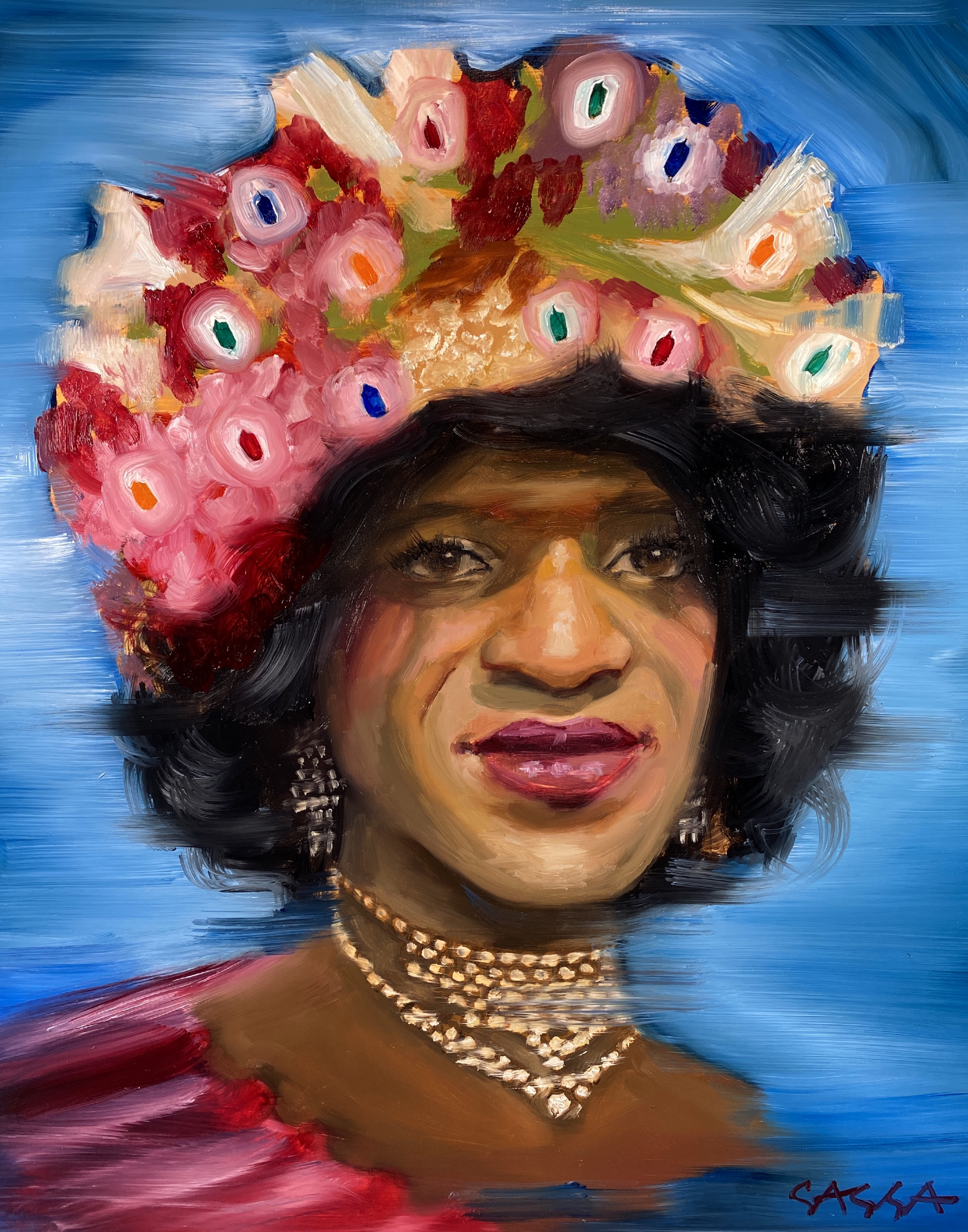Marsha p. Johnson
1945-1992
“You never completely have your rights, one person, until you all have your rights.”
$5 from every print sold will be donated to the Trevor Project
If you are a young person in crisis you can call the Trevor Project 24 hours a day, 365 days a year at 1(866)488-7386
Before I tell you about Marsha P. Johnson I want to share something personal. I didn’t used to speak openly about topics that caused social divides, including politics in general. I had a very specific reason for this. I have a studio where I teach art, and have had many small classes and private students over the years. Many of them were young, and a great many of them have been gay, bisexual, trans, gender non-confirming, etc. In some cases, I was among a very small number of people who knew this about my students. In MANY cases, I was the only adult in their life who accepted it.
LGBTQ youth are about five times more likely than their straight peers to attempt suicide. One factor that reduces this risk by 40% is a relationship with ONE accepting adult. Knowing I was that one adult made it really difficult for me to speak out publicly. I was afraid of alienating the families of my students. I was afraid they might not even have one accepting adult if that happened.
Ultimately, I couldn’t reconcile my silence anymore for a lot of reasons. The biggest one is that I’ve realized that art is my language, and I feel a responsibility to communicate with it in a way that might better the world somehow. I don’t feel I can do that unless I’m speaking real truth. I also don’t want to silence parts of myself that I’ve worked very hard to understand and come to terms with. If you don’t know me well, you may not know that I am “Queer AF”, as the kids say. I’m married to a man, so if I really wanted that to be a hidden part of me, I guess it easily could be. Well not easily, according to my son (thanks Max 😂). I don’t want to hide it though. I fought long and hard for that shit. It was NOT an easy path. And at the time I came to terms with it, unless you identified as gay or lesbian, you were even rejected by the gay community to a large extent.
Maybe this is why I feel so much for trans people. When I was growing up I never felt that I fit in anywhere. I felt like the weirdo in every group, male or female, gay or straight. I’m not in any way comparing my life to this black transgender woman’s, but rather explaining why I easily and willingly love and accept her as a woman. My experience as a woman, regardless of my sexual orientation, is mine. It is different from everyone else’s. No one can ever really fully understand it, and no one can ever take it from me or reduce any part of it. Every other woman in the world has an experience that is vastly different from mine, and it is not my place to choose how different those experiences get to be before someone is stripped of their personal identity. It is my responsibility as a human being, though, to love them and accept them. If you’re reading this and thinking “Duh, this doesn’t even need to be said”, to that I’d respond: Bless your heart. That’s what we say here in West Virginia, where it very much does need to be said. We don’t exactly have the most progressive protections in place for all here in the mountains. Which brings me, finally, to Marsha “Pay it No Mind” Johnson.
Marsha was arrested over one hundred times. Trans people in New York at the time could be charged with sexual deviancy for “cross-dressing”. It was illegal for bars to serve drinks to gay people, and for same-sex couples to dance together in public. She was not exactly an easy hire, and like many trans people at the time, she turned to sex work in order to live. She was often homeless.
Marsha was 23 at the time of the Stonewall Riots, and was a major figure in the resulting Gay Liberation Movement. What’s so unbelievably badass to me about her is how hard she fought for gay rights even when she was openly hated by gay people. She was a tireless activist for LGBTQ rights, AIDS, and homelessness for nearly 25 years. She and Sylvia Rivera founded STAR, an organization that offered housing to homeless and transgender youth.
Marsha’s body was found in the Hudson River after the 1992 Pride Parade. Her death was initially ruled a suicide, but everyone who knew her knew better than that. Her case was reopened several times at the urging of her friends and loved ones, and remains unsolved. The level of violence that black trans women have faced throughout history is staggering. There have been over forty murders of trans people in 2020, the vast majority of which were black and Latinx trans women.
Despite having nearly every possible card dealt against her, Marsha P. Johnson is remembered as an upbeat and positive leader of gay and trans rights. She lived authentically at a time when the world would have much preferred that she hide who she was. I like to think she was giving that world the finger with her over the top attire (Flowery, feathered headdresses with Christmas lights were pretty out there even for a Queen). She dedicated her life to helping others while she was dealing with the same or worse than they were. I wish she hadn’t paid such a price for the trail she blazed for so many others.
Thank you, Marsha P. Johnson.
